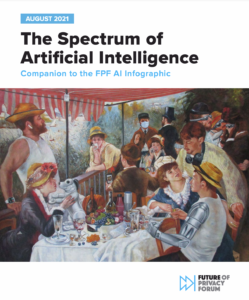FPF Partner in algoaware Project Releases State of the Art Report
State of the Art Report:
After reviewing the literature and consulting a variety of experts, algoaware has released the first public version of the State of the Art Report, open for peer review. The report includes a comprehensive explanation of the key concepts of algorithmic decision-making, a summary of the academic debate and its most pressing issues, as well as an overview of the most recent and relevant initiatives and policy actions of the civil society as well as of national and international governing bodies. The peer-review is executed via four different engagements channels:
- Consultation of experts with proven knowledge on specific sections of the report.
- Targeted calls to provide feedback by the subscribers of their Twitter channel, who will be invited to scrutinize the findings by answering questions on the content of the report.
- Engagement with experts from academia, industry and civil society at presentations and discussions at events and focus groups
- Finally, an open call to give feedback is available through the MetaPDF tool, which can also be found on the algoaware website.
Background:
The algoaware study was procured by the European Commission to support its analysis of the opportunities and challenges emerging where algorithmic decisions have a significant bearing on citizens, particularly where they produce societal or economic effects which need public attention.
The study is carried out by Optimity Advisors and follows a call from the European Parliament for a pilot project supporting algorithmic awareness building. FPF is a partner in this project.
The objectives of the study include:
- contributing to a wider, shared understanding of the role of algorithms, particularly in the context of online platforms, with the intention of raising public awareness and debate of emerging issues;
- identifying the types of problems, emerging issues and opportunities raised by the use of algorithms, and establish a scientific evidence-base for these issues and opportunities; and
- designing and prototyping a policy toolbox including solutions for a selection of problems, including policy options, technical solutions and private sector and civil society-driven actions.
The study will follow a policy design methodology resting on the analysis of scientific evidence as well as a robust stakeholder engagement. It aims to engage with a range of stakeholders across diverse sectors as we seek to map the areas of interest where algorithmic operations bear significant policy implications. To keep up to date with the debate, and for project updates, sign up for the algoaware newsletter here.



